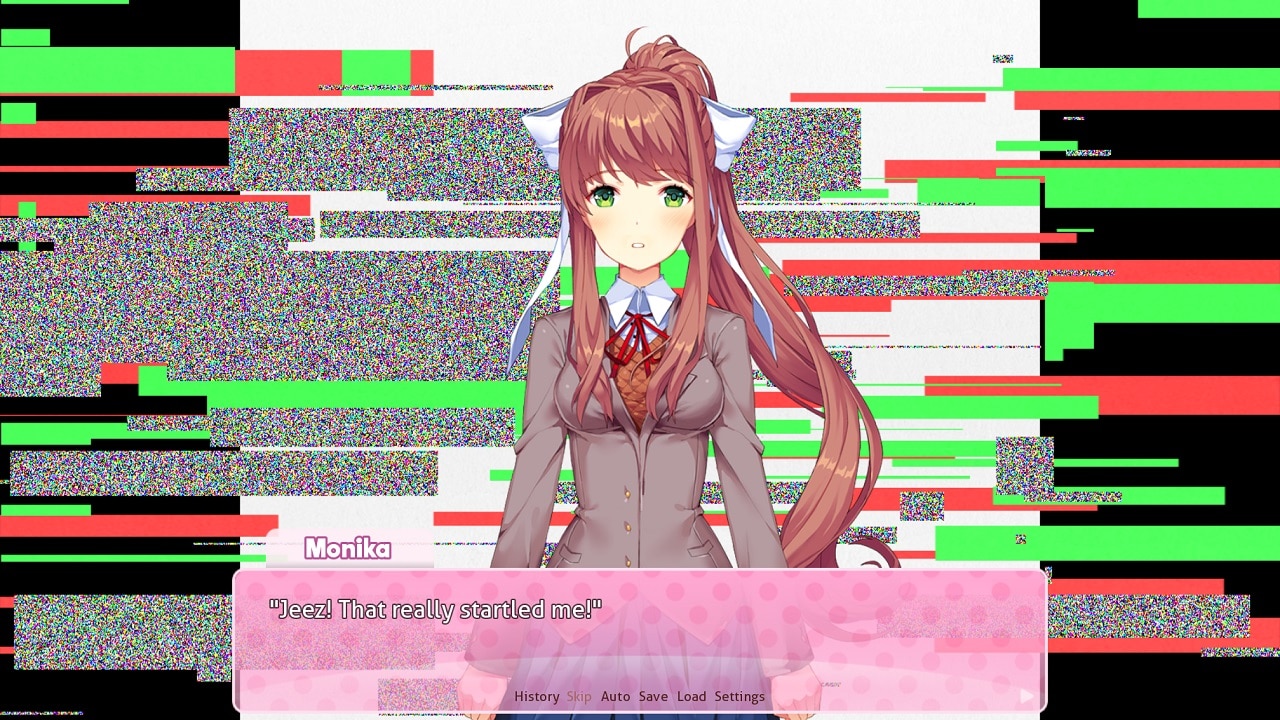The Usage of Medium and Genre
The visual novel has often been criticized by gamers of all areas for their lack of interactivity and lack of agency. However, this couldn’t be further from the truth, as the metagame “Doki Doki Literature Club” uses the medium of the visual novel to its advantage to make it an unpredictable game in more ways than one.
For starters, the game itself is of course unpredictable in narrative. It begins as a typical tropey dating simulator, where the player feels as if the characters fit predictable tropes prior outlined by the visual novel genre. It also puts on a front of being cutesy and very, very pink in color, the anime style of the game matching that of typical dating simulators as well. With this, the player (if they have been able to avoid spoilers, of course) goes through the first part of the game expecting it to follow through on these tropes–and it doesn’t.
When the twist happens and the game turns dark, the player is left not knowing what to expect at all–is this a horror game? Is this a thriller? The narrative itself lends itself to unpredictability, and here is where the actual mechanics of the visual novel come into play to highlight and push this.

Within the coding of the game, there are a large number of events that have small percentages of occuring in each playthrough. This can be anything from a quick glitch effect to a jumpscare to the player’s cursor turning into Sayori’s head–and each player has hundreds of different combinations of these events each time they play the game. The “glitching” of the game of course lends itself to the narrative turning into a meta-narrative, as it grows to be self aware of being a bunch of lines of code, but even someone who’s played the game many times has no clue exactly what to expect–and this brings a new sense of horror to the game.
This also plays into the themes that the game itself is seeming to play at. Taking the original tropes from fiction and turning the characters into unpredictable beings within themself who seem to have gained sentience shows how predictable those original narrative tropes were–and how nuances actual human beings tend to be. When a character themself is unpredictable, they tend to feel more organic, especially in such a game as a dating simulator whereas the narrative is supposed to progress in a very specific way (in terms of other “normal” dating simulators, of course).
This leads me to my final point–why is unpredictability so scary? And how does this lend itself to truly make DDLC such a horrifying game? I think it all comes down to the unpredictability of life itself–one can’t help but feel scared of the unknown, of things they actually can’t control. Whereas visual novels are often criticized for lack of agency, the lack of agency in this game paired with the unpredictable nature in it is what really creates a horrifying experience for the player as they are introduced to new horrors with very little influence over the lives of the characters they are interacting with. And with this, I actually feel like this game mimics real life in such a staunch and candid sense, where people’s emotions and fates are actually out of our own control. And thus, Doki Doki Literature Club serves as a game to reflect the player’s own insecurities about their place on this Earth and in this life.

